NI protocol: Unilateral action by UK government 'could erode peace'
- Published
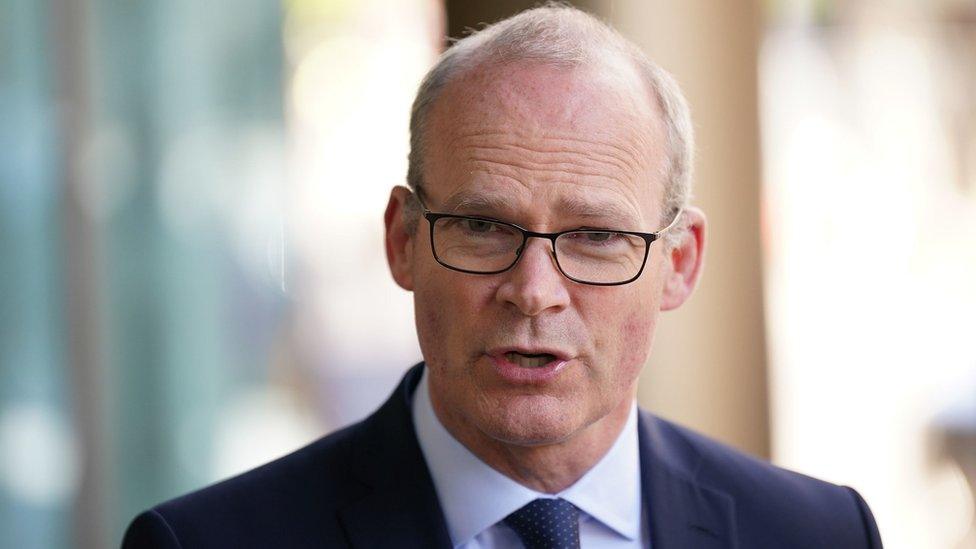
Irish Foreign Minister Simon Coveney says the EU is flexible and want to compromise
Unilateral action by the UK government to change post-Brexit trading arrangements for Northern Ireland could undermine the peace process, Ireland's foreign minister has warned.
Simon Coveney accepted there was a need to address unionist concerns about how the protocol was working.
He said there would be a "consequence" if the UK's actions created significant uncertainty on the island of Ireland.
A UK minister said an EU trade war with the UK would be "self-defeating".
The prime minister will visit Northern Ireland to speak to parties on Monday.
Boris Johnson is expected to tell political leaders any action on the protocol must restore power-sharing.
Mr Johnson's visit coincides with increased speculation that the UK government is poised to introduce legislation to strip away parts of the Northern Ireland Protocol.
The protocol - now under fresh scrutiny following the 5 May assembly election - was designed to ensure free trade could continue across the Irish land border.
The election cemented a majority for assembly members who accept the protocol, including the new largest party, Sinn Féin, but it has been opposed by unionist politicians.
Following the election, the anti-protocol Democratic Unionist Party has refused to engage with the assembly.
A new administration cannot be formed without them.
'Deeply harmful'
Mr Coveney said the way to deal with the problems around the protocol was continued dialogue between the EU and UK.
He also warned that any move by London to walk away from the arrangements would "send headlines around the world that Britain is prepared to break international law".
"What I see at the moment is a British government making statements and briefing against the EU, and creating a lot of tension in my country, your closest neighbour, and also potentially being on the verge of making a decision that could fundamentally undermine the functioning of the institutions of the peace process in Northern Ireland," he told Sophy Ridge on Sunday on Sky News.
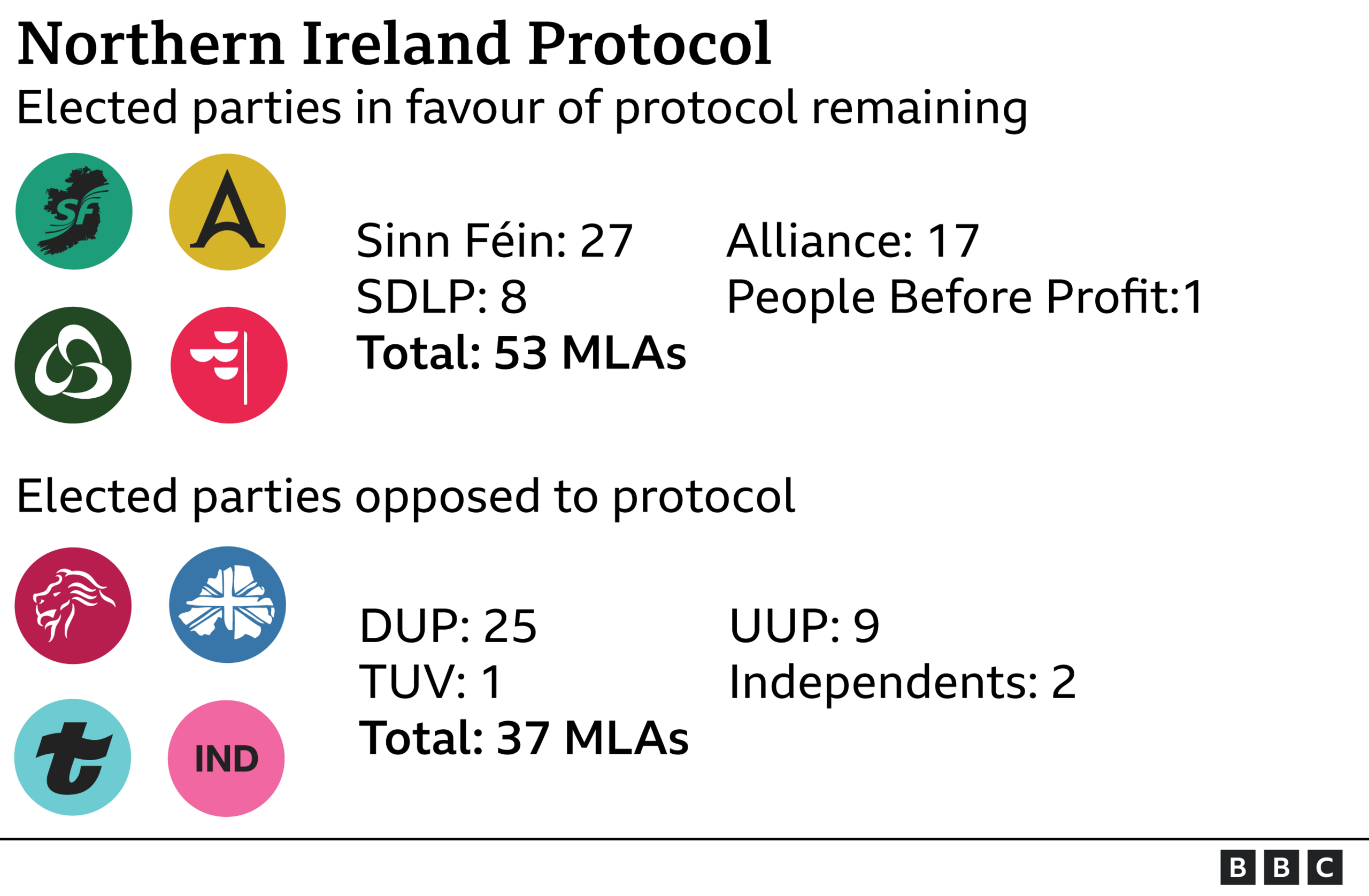
Most politicians elected to the Northern Ireland Assembly want the protocol to remain
Mr Coveney said the EU was flexible and wanted compromise.
"What's happening at the moment has forced Ireland into taking a much more strident position and responding honestly to the unhelpful briefing that we're getting from very, very senior levels of the government this week," he added.
He said the briefings "seems to be laying the groundwork for a decision, I believe, could be deeply harmful to the relationship between Britain and Ireland if we don't see sense in the next few days".
Watch: The business secretary says he does not think there will be a trade war if the UK overrides the Northern Ireland protocol
But Mr Kwarteng said the government's priority was political stability in Northern Ireland, adding "if that means re-looking at the protocol, we absolutely have to do that".
"I don't think there is going to be a trade war. There has been a lot of talk, a lot of threats about what the EU will or won't do. That is up to them," he told the BBC's Sunday Morning programme.
Simon Hoare, chairman of the Northern Ireland Affairs Committee, has accused the government of "testosterone sabre rattling" in the dispute over the protocol.
Speaking to BBC Radio 4's The World This Weekend, the Conservative MP said Foreign Secretary Liz Truss had been a "little too muscular" in negotiations with the EU.
He admitted the protocol was not perfect but the way to improve it was through "dispute resolution mechanisms" already agreed.
"It's frankly a naive nonsense for the government to ask anybody to believe… that it didn't understand what it signed up to," he added.
"You sign agreements, you understand the small print and if you don't you shouldn't be signing it."
The protocol, a part of the UK-EU Brexit deal which keeps Northern Ireland aligned with the EU single market for goods, puts a trade border in the Irish Sea between Great Britain and Northern Ireland.
The DUP has argued the protocol has eroded the foundations devolution has been built upon and undermined Northern Ireland's position in the UK.
The EU has acknowledged that the protocol has caused difficulties for Northern Ireland businesses and it put forward proposals in October to try to ease that burden - it said they would mean a reduction in paperwork and checks on goods entering Northern Ireland from Great Britain.
However, last week the UK rejected these plans saying they would make things worse.
'No substitute for local leadership'
A spokesperson for No 10 said Mr Johnson would hold private meetings with the parties and the UK government would "play its part to ensure political stability".
The prime minister is expected to say there is "no substitute for strong local leadership".
On Monday, Mr Johnson will say that the UK and EU's shared objective should be for a reformed protocol to enjoy a majority support when it faces a consent vote at Stormont in 2024.
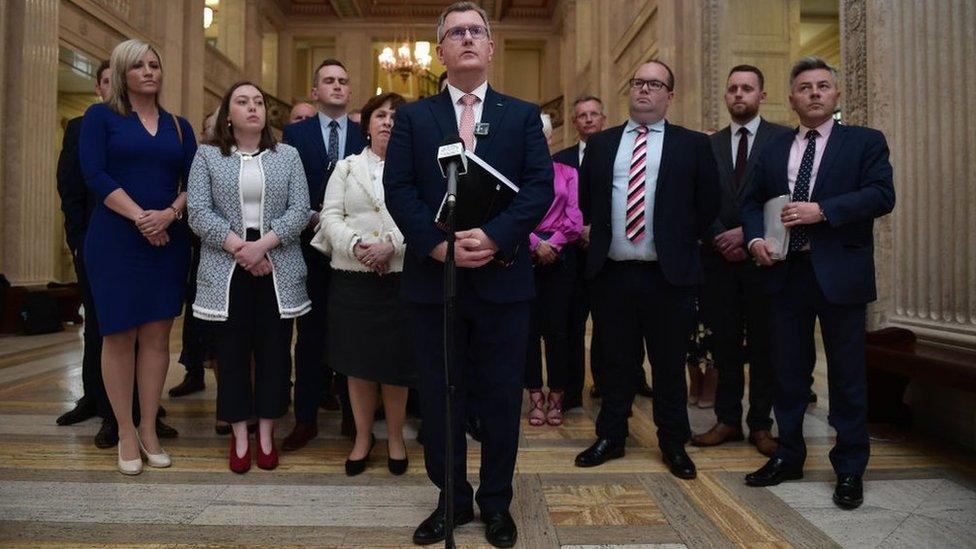
Sir Jeffrey Donaldson says his party will not support the election of a Speaker and deputy speakers until their concerns are resolved
The DUP's move to block the election of a speaker on Friday means the Northern Ireland Assembly cannot function.
The party said its actions sent a clear message about its opposition to the protocol.
On Saturday, Sinn Féin leader Mary Lou McDonald accused the prime minister of being "in cahoots" with the DUP.
Ms McDonald said the protocol was going nowhere and both she and would-be first minister Michelle O'Neill would be telling Mr Johnson so on Monday.
Related topics
- Published14 May 2022
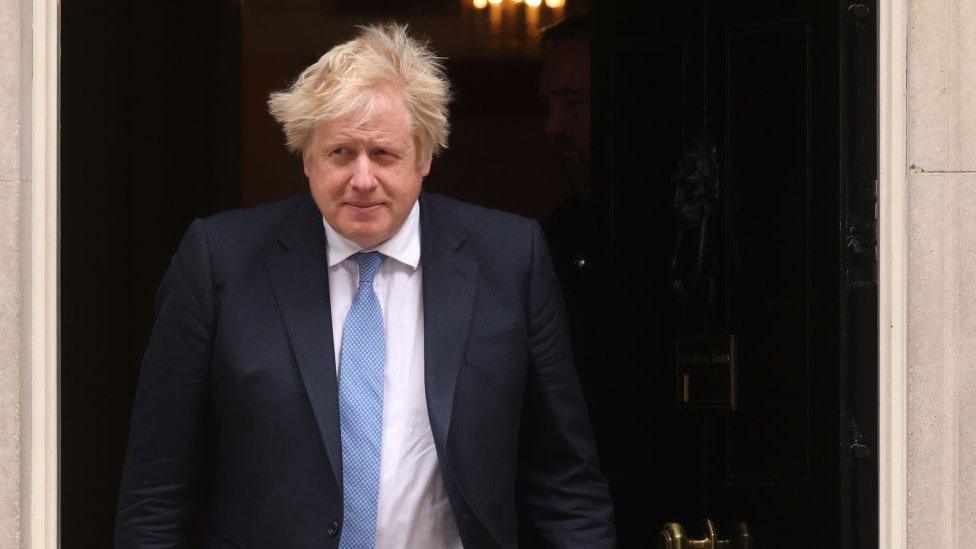
- Published10 May 2022
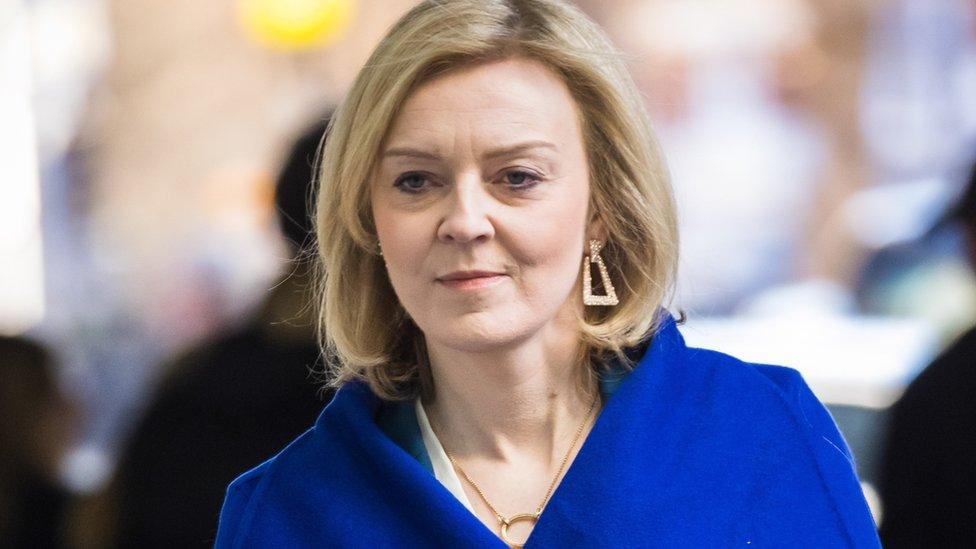
- Published2 February 2024
